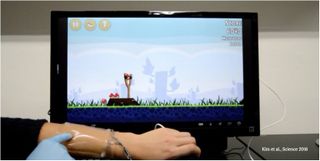Stretchy, Transparent Gaming Controller Acts Like a Second Skin

It's finally happened. Our bodies can now become one with the game controller.
A stretchy, skin-like controller created by materials scientists at Seoul National University promises to turn a forearm into a touchpad for gaming, playing music, and scrawling notes that appear on a computer screen.
RELATED: Pokémon Go: Top 10 Hazards of Augmented Reality Gaming
The team, led by researcher Chong-Chan Kim along with Jeong-Yun Sun, a professor of materials science and engineering, imagines a future where we ditch brittle electrodes for soft, biocompatible technology. No more stiff touch panels for human-computer interactions. So they got to work on a transparent hydrogel one.
They developed the panel using a hydrogel made from polyacrylamide, which is a water-soluble acrylic resin, and lithium chloride salts that act like a conductor. Electrodes on both ends of the panel create a uniform electrostatic field. Pressing on it closes the circuit, allowing the current to flow to the touch point.
Current meters at each corner pick up the signals and transmit them to a separate controller board that connects to a computer, the scientists report in the current issue of Science (abstract).
WATCH VIDEO: Why Video Games Make You Aggressive
Sign up for the Live Science daily newsletter now
Get the world’s most fascinating discoveries delivered straight to your inbox.
"The epidermal touch panel is capable of detecting motions such as tapping, holding, dragging, and swiping," they wrote in their paper. By pressing the panel with one finger, the team could play music on a computer keyboard, move virtual chess pieces, write out letters, and control a video game.
RELATED: Chair Turns Your Butt into a VR Controller
While it's not the most precise touchpad -- the finger-drawn letters spelling "Hello world!" were a little shaky -- having this much control on such a tricky surface is impressive. Their advancement made me think of John Rogers' electronic tattoos, wearable sensors in the works at UC San Diego, and Zhenan Bao's electronic skin work at Stanford.
This controller is even more stretchy than I anticipated. Apparently it still operates after being stretched to more than 1,000 percent of its normal size, the team reported. Following repeated use, the material does lose some of its flexibility, possibly because a bit of the hydrogel water evaporates. Might need a special moisturizer — just like a real arm.
Originally published on Discovery News.
Most Popular



